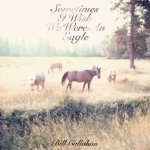
Bill Callahan
Sometimes I Wish We Were an Eagle
(Drag City; 2009)
By Calum Marsh | 18 May 2009
Bill Callahan is a gifted lyricist, his songs often stressing content over form (his minimal arrangements, particularly across his Smog discography, emphasize his distinct baritone by virtue of this dynamic) and so it should come as no surprise that Sometimes I Wish We Were an Eagle is very much a story-driven affair. Its basic narrative concern is a difficult breakup, certainly autobiographical (we needn’t get into the details of that story here; anyone interested already knows the gist of it) but tastefully abstracted so that the resulting work feels intimate and personal without plunging into esoteric livejournal territory.
Like the Mountain Goats’ Get Lonely (2007), An Eagle indulges in its own rejection and dejection, downright wallows in them, because of course these are BIG FEELINGS and, as they say, the art flows more freely in bad times than good. When Callahan sings, “I used to be darker / Then I got lighter / Then I got dark again” on opener “Jim Cain,” his return to sullen disposition and vocalized heartbreak recalls Orson Welles’ improvised assertion in The Third Man: “In Italy for 30 years under the Borgias they had warfare, terror, murder, and bloodshed, but they produced Michelangelo, Leonardo da Vinci, and the Renaissance. In Switzerland they had brotherly love—they had 500 years of democracy and peace, and what did that produce? The cuckoo clock.” If Woke On A Whaleheart (2007) was the cuckoo clock, Sometimes I Wish We Were an Eagle’s Callahan’s triumphant Renaissance.
Callahan works in minor profundities. “Well I used to be sorta blind / But now I can sorta see,” he sings on mid-album highlight “Rococo Zephyr,” his coyly smart wit in top form. And for a record that relies so deliberately on a character arc, Callahan’s lyrical prowess perhaps lends itself best here to one-liners. On “Too Many Birds,” fairly rote nature symbolism meanders only pleasantly before culminating in one of Callahan’s best, and most understated, lines: “If you could only stop your heartbeat for one heartbeat.” In the context of the record’s broader swing the line is fairly innocuous, but delivered as it is here—repeated, with an additional word added at each beat—it’s really quite lovely. This is a fairly standard Callahan convention, these simple sentiments repeated until their profundity is milked clearly through and through, but at its most extreme, as on album closer “Faith/Void,” where “It’s time to put God away” spans nearly the entirety of the song’s somewhat bloated ten minutes, the device is less successful. The track works fine in the context of the album’s thematic momentum, offering a kind of closure in his apparent renunciation of faith (and maybe hope?), but song for song it’s the only real dud.
In a slight divergence from Callahan’s usual minimalism, An Eagle’s compositions have been nicely fleshed out courtesy of Brian Beattie’s assortment of string and horn arrangements. Beattie’s contributions are deliberately downplayed, always taking backseat to Callahan’s assertive vocals, and while the result sounds undeniably richer than the bulk of his oeuvre, scarcity has (thankfully) been retained. At the best moments, the gilding compliments Callahan’s stories rather than simply accompany them—on “Jim Cain,” Callahan sings, “I started out in search of ordinary things / Like how a wave can possibly be,” and a little string flourish swirls up to meet “wave.” Reflexive gestures such as these contribute physical touchstones, anecdotal cues, where the words can’t, symbolism in places Callahan perhaps doesn’t trust.
And it’s quite the story. Or so Callahan makes it seem. On “Eid Ma Clack Shaw,” An Eagle’s strongest track, Callahan describes the extent to which his breakup has screwed him up: “All these fine memories are fucking me down,” he sings, temporarily breaking from restraint and emoting more forcefully. Funny how the good times are all that you find yourself coming back to—not the arguments or the fights, as the reasons for ending a relationship in the first place are the first things you forget—and dwelling on just how good you had it can be the roughest part of any breakup. Callahan seems to understand this, or, in the very least, he seems to have experienced its symptoms firsthand—and “Eid Ma Clack Shaw,” his struggle with the aftermath, begins to feel intolerable. Later, Callahan finds that he’s “dreamed the perfect song,” one which “held all the answers like hands laid on”; he wakes and scribbles it down, only to find the next day that he’s jotted down total nonsense: “Eid Ma Clack Shaw / Zupoven Del Ba / Mertepy Ven Seener / Cofally Rag Dah.” Never mind that the turnaround was a plot point on Seinfeld; the sentiment’s buyable and Callahan’s delivery is threadbare enough to keep things from getting too melodramatic.
Callahan’s heartbreak forms the basis for so many of these tracks that his hurt’s downright palpable. And while self- deprecation and indulgence don’t paint him (or the character he’s embodying, depending on how you want to read it—see, for instance, “Jim Cain,” which could be, eh, about author James Cain) as especially palatable, his harried chronicle of depression makes for an entertaining listen. It’s a mopey jaunt through personal history, one less sentimental or nostalgic than it is smartly reflective and ruminative.





